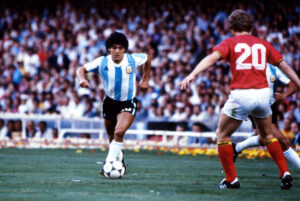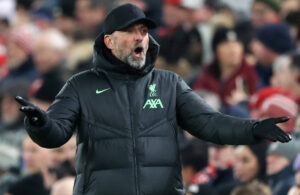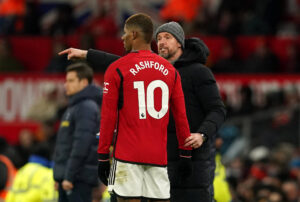The very biggest finals in football – that is, World Cup finals or Champions League finals – are rarely feasts of football, for the simple reason that there is so much at stake that even the bravest players are often inhibited by an awareness of how much they have to lose. That was evident again in this year’s Champions League Final. Manchester City’s players, who had already been almost fatally undermined by Pep Guardiola’s inexplicable decision not to play Fernandinho or indeed any specialist defensive midfielder in a six-man midfield, subsequently underperformed against Chelsea. The same is true of European Championship finals – fear usually takes hold. However, a few have been outstanding games and at least one was a classic.
Here, then, are the Five finest Euro finals, in ascending order.
The Finest European Championship Finals
5. 1968: Italy Eventually Defeat Yugoslavia in a Second Final 2-0, After the First is Drawn 1-1
In Italy, it is called ‘The Curse of the Euros’, the widespread – indeed, almost countrywide – belief that Europe’s joint most successful nation in World Cup history (like Germany, Italy have won four World Cups, second only to Brazil’s five) is somehow doomed to failure in the European Championships. However, in 1968, Italy did win the European Championship, even if it took them two finals to do so.
The first final was played on 8 June 1968 at the Stadio Olimpico in Rome and ended in a 1-1 draw. After extra time and before penalty shootouts were introduced (more on those shortly), the two teams reconvened two days later in the same stadium. The second match took place in front of only 32,000 fans, less than half the size of the 68,000-attendance for the original game. If Italian fans had known that their country would go on to struggle so badly in subsequent European Championships, they may not have been so blasé about attending a second final in 1968.
Those 32,000 souls saw the Italy side of Zoff, Burgnich and Fachetti, most of whom had enjoyed European Cup success with either AC Milan or Inter during the 1960s, win Italy’s first major international trophy since Vittorio Pozzo’s famous side of the 1930s retained the World Cup in France 30 years earlier. That they did so against a Yugoslavia team made up mostly of the Partizan Belgrade side that had reached the 1966 European Cup final, beating the Manchester United of Charlton, Best and Law en route, made the achievement even more impressive.
4. 1992: Denmark 2-0 Germany
The Euro 92 final between Denmark and Germany produced probably the biggest shock result of any Euro final. Germany had gone into it as reigning World Champions and were bidding to match the legendary status of the West Germany team of the 1970s by doubling up with the European Championship. Underdogs Denmark, however, had other ideas. They took the lead early on with a goal by defensive midfielder Jon Jensen, held out for an hour and then settled matters with a late second from Kim Vilfort, another midfielder.
Denmark, of course, proved the benefit of having absolutely no preparation at all for a major tournament. Their players had been summoned from their summer holidays to replace Yugoslavia after the Balkan Wars had led to the break-up of that country and the withdrawal of the national side from the Euros. As if utterly unburdened by expectation, the 1992 Denmark side outdid their more celebrated forebears of the 1980s by actually winning a tournament. And in the process, they showed that one of the many joys of the European Championship is that a relatively small nation (both in population and footballing tradition), such as Denmark in 1992 or Greece in 2004, can become Kings of Europe.
3. 1964: Spain 2-1 USSR
Prior to the remarkable Renaissance of the Furia Roja (Red Fury) at the end of the noughties, during which time they won three successive major international tournaments, Spain’s sole international tournament victory had been achieved on home soil more than forty years earlier. That came when they defeated the USSR 2-1 at the Santiago Bernabeau, with Real Zaragoza’s Marcelino Martínez scoring an 84th-minute winner to defeat the defending champions and prompt wild celebrations in the Spanish capital.
The 1964 European Championship final was a closely contested game, but it was an even better ‘political football’ match. That was because it came at the height of the Cold War, when General Franco’s Spain, supported by the US, defeated a Soviet Union side that was the footballing flag-bearer for global Communism. Four years earlier, in the first European Championships, Franco had actually forbidden Spain from playing the Soviet Union in the quarter-finals, so fearful was he of a propaganda victory for his Communist foes. They simply withdrew and the USSR went on to win the tournament. In 1964, however, Franco’s Spain gained a modicum of revenge, even if their sole European crown was not greeted nationwide with the same fervour as the much later hat-trick of victories in major international tournaments.
2. 2000: France 2-1 Italy (AET)
And so we come to the top two European Championship Finals, which are the top two by some distance and the two truly outstanding Euro finals. The first of them was the final of Euro 2000, which was the first European Championships to be hosted by more than one nation (the Netherlands and Belgium). It was generally a joyous affair, at least until the Dutch crashed out on penalties against Italy in the semi-final, despite the Italians playing much of the match with only nine men after having two players sent off.
France’s progress to the final had been more serene, notwithstanding the fact that their own semi-final against Portugal was only won by a late Zinedine Zidane penalty. France, the reigning World Champions, were a truly great team spearheaded by the peerless Zidane, and so were clear favourites for the final. However, Italy, led by their own all-time great Paolo Maldini, took the lead early in the second half and held on until just before the end. That was when French substitutes Robert Pires and Sylvain Wiltord (who would go on to serve Arsenal so well) combined for Wiltord to score a 90th-minute equaliser. Then, in extra time, a third French substitute, David Trezeguet, scored the winner to give France the double in international football – being European and World Champions simultaneously.
1. 1976: Czechoslovakia 2-2 West Germany (Czechoslovakia Win 5-3 on Penalties)
In 1976, West Germany were on the brink of winning a third major international tournament in a row – Euro 76, to go alongside Euro 72 and the 1974 World Cup. It would have given them the greatest treble in international football history more than 30 years before Spain eventually achieved it. However, they fell at the final hurdle, in the greatest ever European Championship final, losing 5-3 on penalties, the first time that a major international football final had been decided by spot-kicks.
Of course, one of those penalties – the very last one taken – is infinitely more memorable than all the others. It is, of course, the Panenka, as any penalty that is simply chipped over a diving goalkeeper is still called today. The man who took it was Antonin Panenka, whose first name may be largely forgotten now but whose surname is immortalised. Panenka is the only player in all of football history to have given his name to a particular footballing move or action. Even ‘The Cruyff Turn’ is precisely that – it is never just called ‘The Cruyff’ – whereas the Panenka is universally understood as the most audacious way to take a penalty. And for Antonin Panenka to have scored the original Panenka in a European Championship final is reason enough for his name to be remembered forever.
Main Photo






